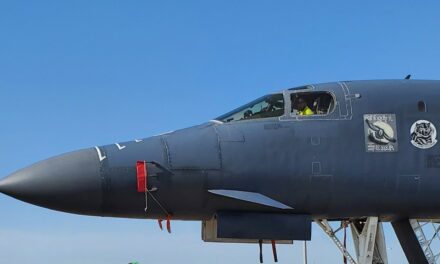We support our Publishers and Content Creators. You can view this story on their website by CLICKING HERE.
Terror Threats at the Forefront of the 2024 Summer Olympics: The Summer Olympics represents the world’s leading sporting event that includes athletes from all over the world. This year, the Summer Olympics will take place in Paris, France.
Paris, a serene capital city with a rich history, also has a growing concern about Islamic extremism, which could greatly affect the Olympic Games.
The French government is taking every precaution and preparing security contingencies instead of global spillovers and domestic socioeconomic issues to prevent potential attacks.
The 2024 Summer Olympics
France, a Western European country that continues to deal with extremism, is wary of lone wolf and coordinated terrorist attacks during the Olympics, which will bring in tens of millions of tourists and the world’s top athletes.
Several years ago, France was intertwined with terrorist attacks by ISIS operatives and their followers, such as the November 2015 Paris Attacks, Charlie Hebdo Shooting, Kosher Market Siege, and others.
The country is currently experiencing a rise in hate crimes, including lone wolf stabbings, inspired by radicalization from the global spillover from the Middle East. The French government, preparing for all worst-case scenarios, has laid out various policies to make the Olympics as sure as possible.
Contingencies Amongst Heightened Tensions and Alertness
Preparations for the opening ceremony include cutting attendance in half, which would allow French intelligence agencies, local police, and other departments to monitor the event without having to expand resources. Unfortunately for French officials, the country’s security apparatus is already exhausted, according to Politico.
On March 28th, Le Monde reported that France requested foreign allies to send members of their intelligence apparatus and security forces to help the overstretched government during the games. Joanna Klejszmit, the Polish Armed Forces General Staff spokeswoman, confirmed to AFP news that a task force will be designated for the Summer Olympics.
Partnering with US security firms, Paris will enact high-tech surveillance systems, such as facial recognition. Alongside the River Seine, guests from outside the city, tourists, and even residents can be subjected to background checks.
Tourists will also be barred from riverbanks during the opening ceremony in fear that drones, which can be weaponized for direct or suicidal dives, could be used for attacks.
Already seen in Ukraine, the first-person view, also called FPV drones, has changed the face of warfare and potentially global terrorism. Cheap and easily accessible, the drones can effectively take out key infrastructure, military equipment, and personnel.
The controversial measures will make this year’s Summer Olympics the strictest Olympic Games in world history and the one with the most concerns since the Atlanta and Munich games.
A Global Spillover from the Middle East, Africa, and Ukraine
France hosting the Olympic Games is tied to heightened tensions across various regions—many of which French foreign policy is intertwined.
One of the origins of the growing threats from extremism extends to former French colonies, where a brutal Islamist insurgency has embroiled North and Central Africa over the past two decades.
A ‘coup belt’ has formed within France’s former colonies with hallmarks of Russian hybrid warfare. France had a dark past in Africa, and the influence of the Kremlin helped prop up military juntas with the domino effect of surging migration into Europe.
ISIS, which has a growing presence in the coup belt and has also conducted numerous attacks in Europe, could attempt to use the Olympics as a prime target for a resurgence—something Paris and fellow Western security agencies are well aware of.
Another major security threat is the possibility of Russian cyberattacks, foreign intelligence infiltration, or hybrid warfare. Russian foreign intelligence services have already conducted high-profile attacks and operations inside NATO members, such as the UK, Montenegro, Albania, and Czechia.
France has stepped up immensely in aiding Ukraine in the past few months, with French President Emmanuel Macron going as far as proposing a potential direct military intervention if the war continues to deteriorate. Russia has taken the comments and support from France harshly and could prepare potential hybrid or direct attacks—something European intelligence agencies have recently warned of.
Arguably, the biggest threat to the summer games comes from the global spillover of the Israel-Hamas War. The ongoing conflict has brought forth worldwide attention, protests, and lone-wolf attacks in France.
Multiple attacks, including stabbings and a recent kidnapping and sexual assault of a Jewish woman in a Palestinian-revenge style lone wolf hate crime, have taken place in France since the October 7th terrorist attacks. France itself has a high Jewish population that already has gone through a rapid decline as antisemitic attacks rise, which correlates with a growing Muslim population that has had problems assimilating.
Olympics in Paris, an already populated and sought-out capital for tourists, could see not only antisemitic threats but also attacks from sleeper cells and disgruntled extremist Muslims, which the French government has struggled to contain.
Amongst heightened tensions, numerous threats, intertwining global conflicts, and an already stretched-thin security apparatus, the Summer Olympic Games in Paris will be the most sought out by foreign adversaries and extremist groups to plot attacks, and France and her allies will look to avoid another potential Atlanta Bombing or Munich Massacre.
About the Author: Julian McBride
Julian McBride is a forensic anthropologist, SOFREP contributor, and independent journalist born in New York. He reports and documents the plight of people around the world who are affected by conflicts, rogue geopolitics, and war, and also tells the stories of war victims whose voices are never heard. Julian is the founder and director of the Reflections of War Initiative (ROW), an anthropological NGO which aims to tell the stories of the victims of war through art therapy. As a former Marine, he uses this technique not only to help heal PTSD but also to share people’s stories through art, which conveys “the message of the brutality of war better than most news organizations.”

 Conservative
Conservative  Search
Search Trending
Trending Current News
Current News 





